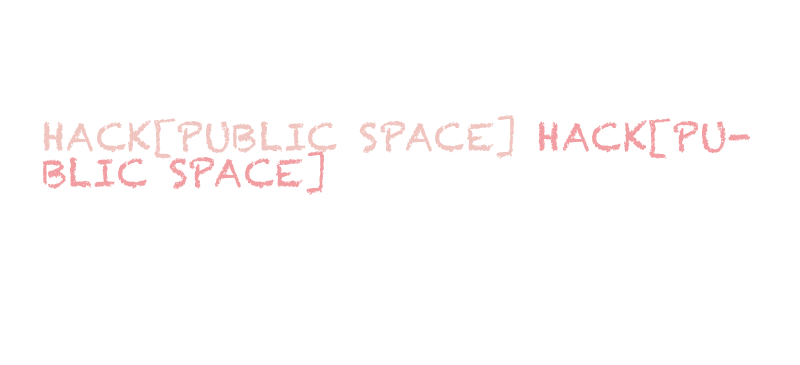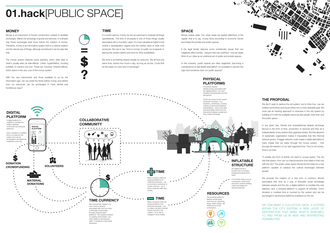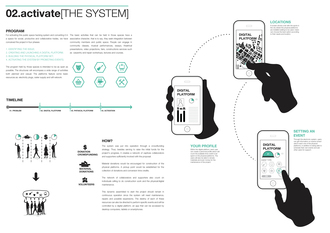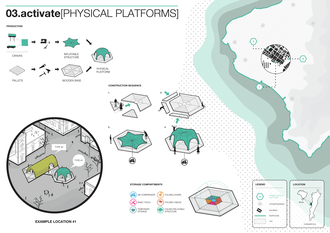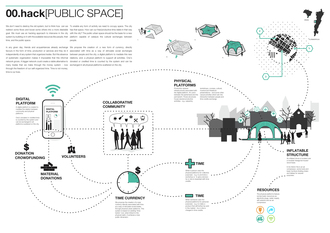How to quote this text: Silva, D.F., Mattos, E.A.C. and Fontenelle,
R.B., 2014. Hack[public space]. V!RUS, 10. [e-journal] Available at:
<http://www.nomads.usp.br/virus/virus10/?sec=7&item=1&lang=en>
[Accessed dd mmm yyyy].
Diego Fagundes da Silva is architect and urban planner. Master in Urban
Planning, History and Architecture of the City. He is one of the founders of
the hackerspace called “Tarrafa Hacker Clube”. He researches
architecture, design, illustration and artistic projects with public
exhibitions and interventions.
Erica Azevedo da Costa e Mattos is architect and urban planner. Master in
Urban Planning, History and Architecture of the City. She is one of the
founders of the hackerspace called “Tarrafa Hacker Clube”. She
researches relations among Architecture, Urban Planning, emerging technologies,
and creation and learning collaborative processes.
Romullo Baratto Fontenelle is architect and urban planner. He researches
cinema, media, urban art, public space, art installations.
Abstract
The way we interact as citizens in new
global and local scenarios is changing how we build our cities, how we relate
as individuals and how we assign value to our work. We use the digital tools
available to create new physical and virtual territories which are the supports
for our activities and needs. Concepts like open source and crowdsourcing are
manifestations of our unceasing search for adaptation. Within this context
architects, designers and other cultural producers are seen as fosterers of
projects with which, besides contributing with their specific skills, they can
also investigate, invent and take alternative courses of action.
Our proposal is a reaction against this context created by countless forces.
We develop our discourse around three elements - money, time and
space –to suggest an empowering engine, a way to take control, or simply
a survival strategy. We propose to create a currency associated with time, a
mediating digital platform and physical infrastructures supporting the
productive activities. Someone’s time is counted by the digital system linked
to the physical platforms which compose a complex system spread throughout the
city.
Context
In the recent years we have seen the rise of new forms of economic and
commercial interchange like crowdsourcing (Howe 2009), social currencies
(Schumacher 1989; Freire 2011) and time banks (Cahn 2011), all based in and
supported by networks acting in local or wider, global domains. Likewise, a new
structure of knowledge construction based in open source (History of the OSI
2012) and do it yourselfideals echoes in numerous fields, from exact to social
applied sciences, arts and communication, thus generating new dynamics and
creative changes. Could these experiences be understood as symptoms of deeper
social changes? Can they be taken by us – architects, designers and urban
planners – as part of practices that will define in the future both new forms
of sociability and spatial design and production? Within the theme of the
current issue of V!RUS magazine – “Do It Yourself!” – how can we
conceive these new social and economic realities in a collaborative and
horizontal way?
The way we interact as citizens in new global and local scenarios is also
changing how we face public issues, how we use the digital tools available and
how we create new physical and virtual territories for our own activities and
needs. Within this context we are constantly pushed to question our actions and
look for alternatives. Hannah Arendt’s treaty, entitled “The Human Condition”,
describe action as a necessary catalyst to the pluralistic human condition,
expression of both the public and individual domain. This interpretation of
action requires freedom for us to move towards a collective project that is at
the same time bottom-up and top-down (Pereira et al 1993). Simultaneously,
these new forms of interaction can lead us to explore forms of collectiveness
which will enable different ways of compensation for the work of designers and
architects. New paths are now open so we can find other funding sources more
appropriate to foster both specific architectural projects and more radical
urban interventions.
Our proposal hack [PUBLIC SPACE] is a reaction against this
complex context created by countless forces. We develop our discourse around
three main elements - money, time and space –to suggest an
empowering engine, a way to take control, or simply a survival strategy, in
short, a way of acting in the city.
As a synthesis of these concerns we propose the creation of: a new model of
currency directly associated with time to stimulate social exchanges between
people and the city; a digital platform to mediate these new forms of
relationship; and a physical platform supporting all these activities and
assigning them new meanings. Time donated or received by someone is counted by
the digital system and can be “exchanged” in each of the physical platforms,
which compose a complex system spread throughout the city.
Money
Money is a man-made instrument created to facilitate exchanges, mostly the
exchange of goods and services. Overall, those exchanges exist since before the
creation of money. Therefore, money is a culturally created information system,
not the natural way of things, although sometimes we see it like that.
The financial system features some specificities which are often understood
as side-effects. Crisis, hyperinflation, housing bubbles, violence and
competition, to mention only few. Those are, however, inherent effects which
stand in the very core of the monetary system. It is worth thinking how –
through the new instruments and flows brought to us by so called “information
age” – we can revisit certain principles and rethink the way our resources can
be exchanged in more ethical and fruitful forms.
Time
In a world ruled by money we are accustomed to evaluate all things
quantitatively. All people’s time is one of those things usually associated
with a monetary value. It is more valuable as higher the worker’s
specialization degree and the market value of what s/he produces. We use to say
“time is money” to justify our incapacity in leaving this system behind and
look for other possibilities. But time is something equally shared by everyone.
As long as we live, we all have the same amount of time: twenty-four hours a
day, divided in productive and non-productive parts. Could this shared time be
the basis of a new kind of exchange?
Space
Money makes cities. Our urban zones are spatial reflections of the capital,
that is to say, money flows according to economic trends shaping private and
public spaces. We might then easily think of our cities as an anti-ethical
ensemble of public and private spaces.
In this scenario, public spaces are often neglected and become a direct
consequence of brutal engines of real estate speculation and other disputes of
interest. Is it possible to subvert this logic and somehow invade and reclaim
our public spaces?
Proposal
We don’t need to destroy the old system, but rather think how we can
redirect and boost some flows towards a more desirable and fair goal. We
propose a hackerapproach as intervention in this complex system that is the
city, building upon it with the available resources, that is, people, their
time and the public space.
Currently some social groups already perform exchange of favors in form of
time, production or even services. Nevertheless, this is made independently of
any commercial organization system. The absence of systematic organization
makes it impossible that this informal network grows. A bigger network could
create a viable alternative for many trades that we make through the money
system - now through the freedom of our self-organized time. Time is not money,
time is our lives.
To enable any form of activity we need to occupy space. The city has that
space. How could our free/productive time be related in that way with the city?
The public urban space should be the basis for a new platform capable of
catalyze the cultural exchanges between people.
We propose the creation of: a new form of currency, directly associated with
time as a way of stimulate social exchanges between people and the city; a
digital platform to mediate these new relations, and; a physical platform to
support all activities. One’s donated or credited time is counted by the system
and can be exchanged in all physical platforms scattered on the city.
We can make a collective hack, a system within the city system, a new layer
of abstraction that make what's available to and from us in new and interesting
possibilities.
References
Arendt, H., 2007. A Condição Humana. 10th ed. Rio de
Janeiro: Forense Universitária.
Cahn, E., 2011. Time Banking: An Idea Whose Time Has Come? Yes!
[e-journal]. Available at:
<http://www.yesmagazine.org/new-economy/time-banking-an-idea-whose-time-has-come>
[Accessed 14 October 2014].
Freire, M.V., 2011. Moedas sociais: contributo em prol de um marco legal
e regulatório para as moedas sociais circulantes locais no Brasil. Doctoral
dissertation, Universidade de Brasília. Available at:
<http://repositorio.unb.br/handle/10482/9485> [Accessed 14 October
2014].
Howe, J., 2009. Crowdsourcing: Why the Power of the Crowd Is Driving the
Future of Business. New York: Crown Business.
History of the OSI. 2012. [Online] Available at:
<http://opensource.org/history> [Accessed 14 October 2014].
Pereira, L.C.B., Maravall, J.M. and Przeworski, A., 1993. Economic
Reforms in New Democracies: A Social-Democratic Approach. Cambridge,
England; New York, NY, USA: Cambridge University Press.
Schumacher, E.F., 1989. Small Is Beautiful: Economics as if People
Mattered. New York: Harper Perennial.


